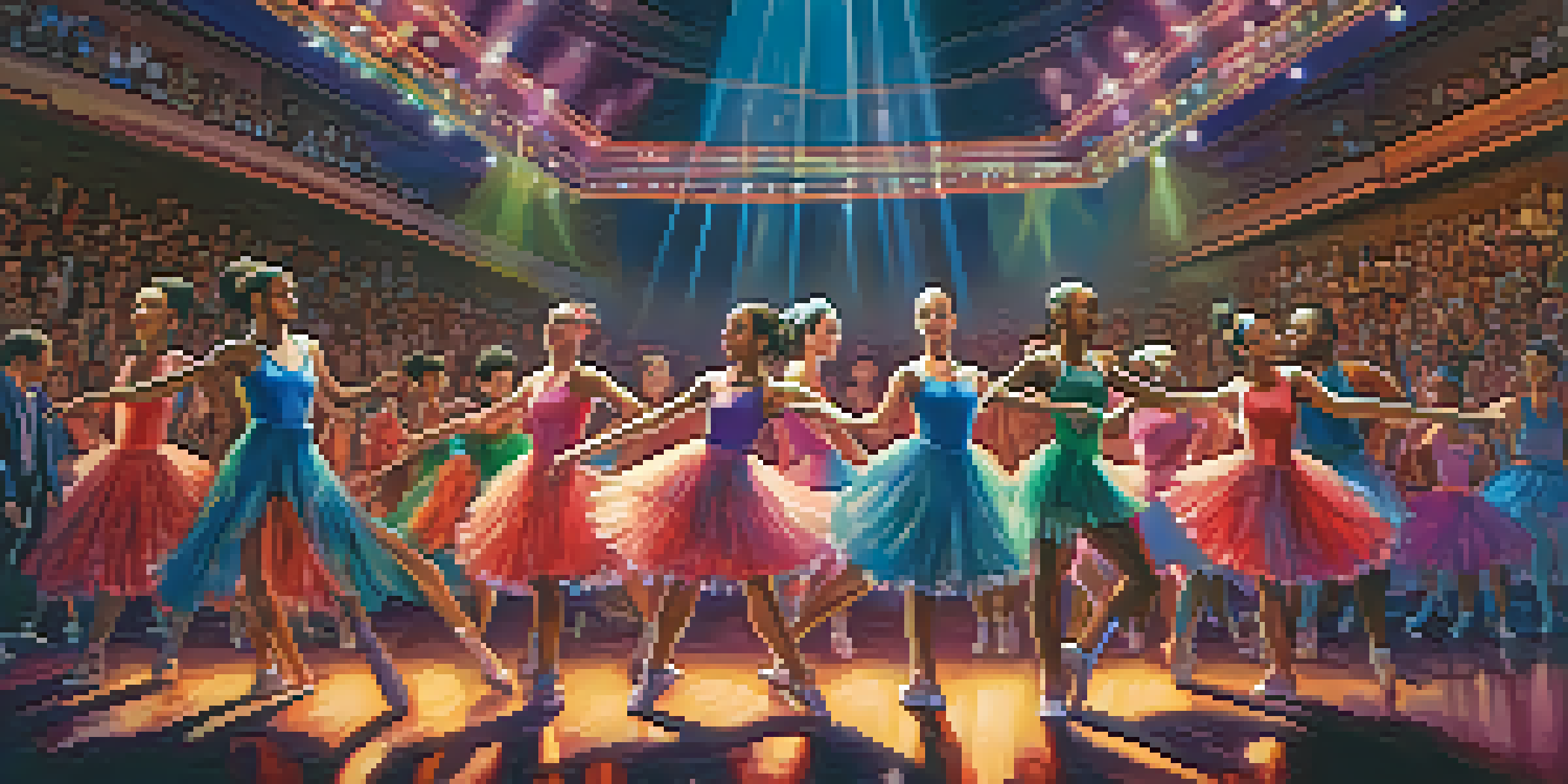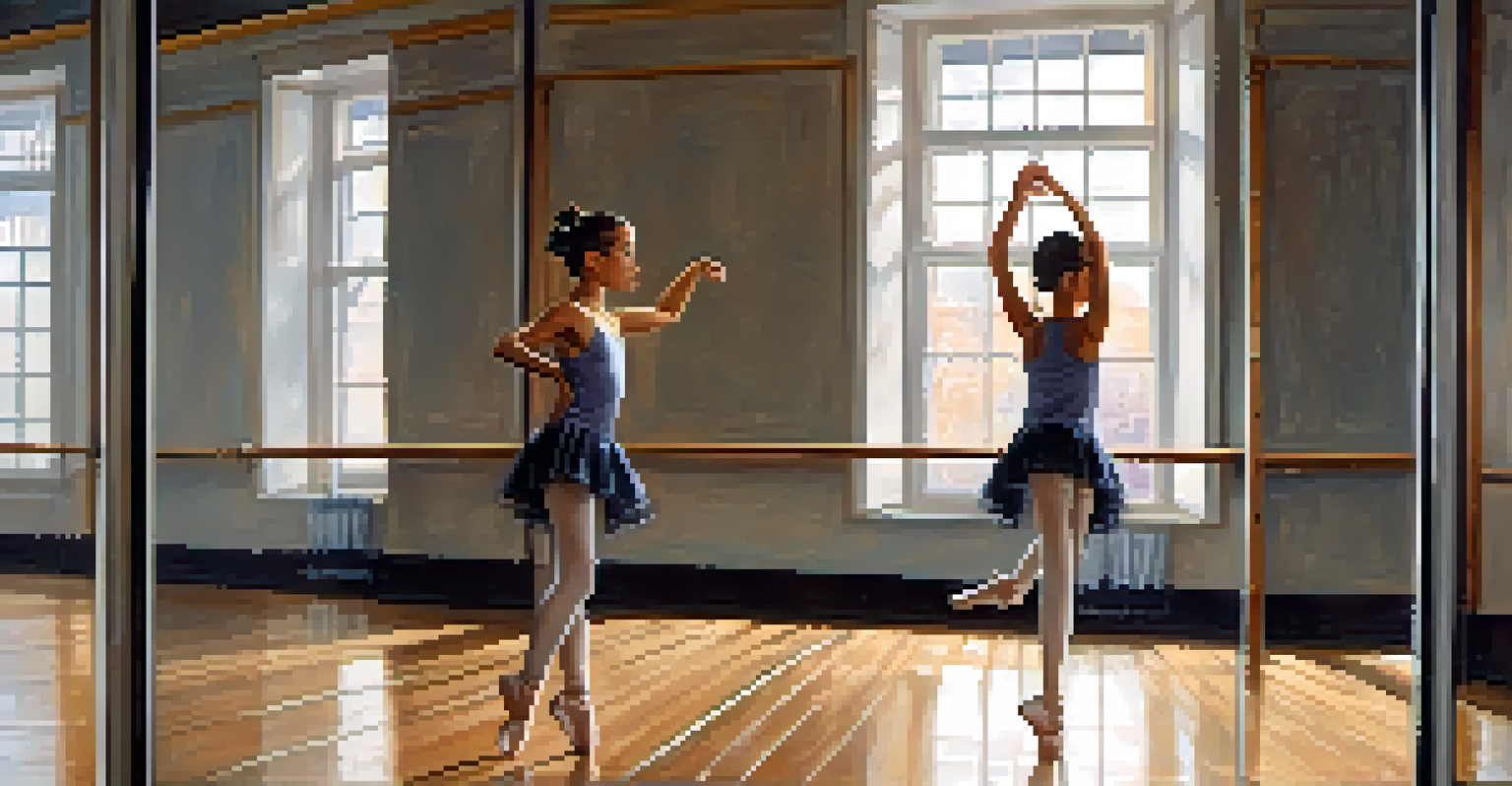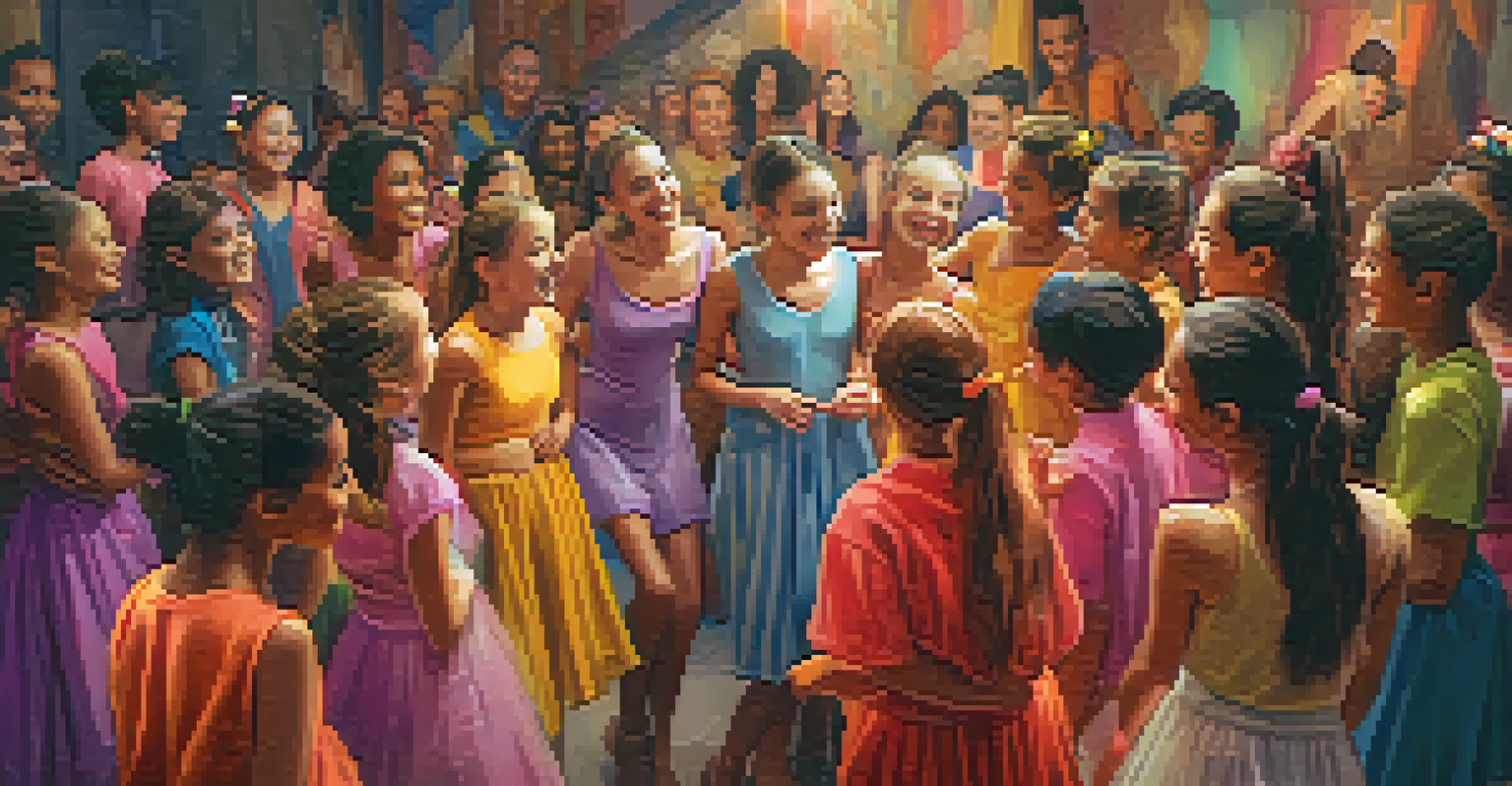Dance Competitions: Empowering Youth Through Performance

The Joy of Dance: A Universal Language for Youth
Dance is more than just movement; it's a universal language that transcends barriers and connects people. For youth, it serves as a powerful form of expression, allowing them to convey emotions and stories that words often can't capture. Engaging in dance helps young people find their voice in a world that can sometimes feel overwhelming.
Dance is the hidden language of the soul.
Through dance, they can explore their creativity and individuality, learning to express themselves in ways that are both personal and relatable. This sense of freedom and self-expression is crucial during formative years, where identity is constantly being shaped. Dance competitions provide a platform for these young artists to showcase their talents and be celebrated for them.
Moreover, the joy of dance fosters a sense of belonging, as participants bond over shared experiences and passion. This community aspect not only enhances their love for dance but also encourages friendships that can last a lifetime.
Building Confidence Through Competitive Spirit
Participating in dance competitions can be a transformative experience for youth, particularly when it comes to building confidence. Standing on stage in front of an audience requires a level of self-assurance that many young dancers may initially lack. However, with practice and preparation, they learn to embrace their skills and take pride in their performances.

The competitive element pushes dancers to improve and strive for excellence, which can be incredibly empowering. As they receive constructive feedback from judges and peers, they gain valuable insights that help them refine their technique and artistry. This continuous growth fosters a mindset of resilience, teaching them to handle both success and setbacks with grace.
Dance as Self-Expression
Dance provides youth with a powerful outlet for expressing emotions and individuality in a supportive environment.
With each performance, dancers learn to trust themselves and their abilities, which translates into other areas of their lives, such as academics and social situations. The confidence they build on stage can inspire them to take greater risks and pursue their passions fearlessly.
Teamwork and Collaboration: Skills for Life
Dance competitions often involve group performances, which are a fantastic opportunity for youth to learn the importance of teamwork and collaboration. Working together towards a common goal cultivates essential skills like communication, compromise, and leadership. These experiences can be incredibly rewarding, as they teach young dancers how to support one another both on and off the stage.
The only way to make sense out of change is to plunge into it, move with it, and join the dance.
Each dancer contributes their unique strengths to the performance, reinforcing the idea that everyone has something valuable to offer. This collaborative spirit fosters a sense of camaraderie, creating bonds that can enhance their overall experience. Learning to rely on others and be reliable in return is a lesson that extends far beyond the dance floor.
As they navigate the ups and downs of group dynamics, youth develop social skills that will benefit them throughout their lives. The ability to work effectively with others is crucial in any setting, whether in school, future jobs, or personal relationships.
Cultural Awareness Through Dance Styles
Dance competitions expose youth to a variety of dance styles, each rooted in different cultural traditions. This exposure not only enriches their understanding of dance but also fosters cultural awareness and appreciation. Learning about different styles encourages dancers to explore new perspectives and celebrate diversity.
For instance, a dancer trained in ballet may discover the rhythms of hip-hop or the grace of contemporary dance. Each style brings its own unique techniques and storytelling methods, inviting dancers to step outside their comfort zones. This exploration allows them to broaden their artistic horizons and become well-rounded performers.
Building Confidence Through Performance
Participating in dance competitions helps young dancers cultivate confidence and resilience, empowering them in various aspects of life.
Moreover, competitions often feature dancers from diverse backgrounds, creating a vibrant atmosphere that celebrates cultural richness. This interaction teaches youth the value of inclusivity and respect for different cultures, helping to build a more empathetic and understanding world.
Discipline and Commitment: Keys to Success
To excel in dance, youth must develop discipline and commitment, two qualities that are essential for success in any endeavor. The rigorous training schedules and practice routines required for competitions instill a strong work ethic. Dancers learn to prioritize their time and put in the necessary effort to achieve their goals.
This commitment to their craft teaches them the importance of perseverance, especially when faced with challenges like physical exhaustion or performance anxiety. As they push through these difficulties, they build mental toughness that can help them navigate life's challenges outside of dance. The discipline they cultivate translates into improved focus and determination in other areas, such as schoolwork.
Ultimately, the values of discipline and commitment shape young dancers into responsible individuals who understand that success often comes from hard work and dedication. These lessons remain with them long after the final curtain falls, guiding them in future pursuits.
The Role of Mentorship in Dance Competitions
Mentorship plays a vital role in dance competitions, providing youth with guidance and support from experienced dancers and instructors. Having a mentor can make a significant difference in a young dancer's journey, as they offer insights and encouragement that nurture growth. These relationships often blossom into friendships, creating a supportive network for young artists.
Mentors help dancers set realistic goals, refine their techniques, and navigate the competitive landscape. Their expertise and encouragement can instill a sense of confidence and direction, pushing youth to reach their potential. By sharing their own experiences, mentors teach valuable lessons about resilience and the importance of following one’s passion.
Friendships and Lifelong Memories
The shared experiences in dance competitions create lasting friendships and cherished memories that enrich the youth's journey.
In this way, mentorship fosters a culture of giving back, as young dancers often aspire to become mentors themselves in the future. This cycle of support not only strengthens the dance community but also ensures that the knowledge and love for dance are passed down through generations.
Creating Lifelong Memories and Friendships
Dance competitions are not just about winning trophies; they are also about creating lasting memories and friendships. The shared experiences during rehearsals, competitions, and post-performance celebrations forge bonds that can last a lifetime. These moments become cherished stories that dancers carry with them long after they’ve left the stage.
The excitement of preparing for a competition, the nervous energy before a performance, and the joy of celebrating each other's successes contribute to a unique camaraderie. These experiences form a sense of belonging within the dance community, creating a support system that extends beyond dance. As dancers cheer each other on and celebrate their achievements, they form connections that enrich their lives.

Ultimately, the friendships fostered through dance competitions become a vital part of youth's personal development. These connections provide emotional support, encouragement, and a shared passion that continues to inspire them, long after the final bow.